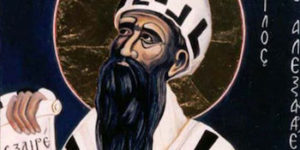
Cyril of Alexandria
*The birth of Cyril of Alexandria is celebrated on this date in c. 376. He was a Black North African leader.
Little is known about Cyril's early life. He was born in Didouseya, Egypt, modern-day El-Mahalla El-Kubra. A few years after his birth, his maternal uncle Theophilus rose to the powerful position of Patriarch of Alexandria. His mother remained close to her brother, and Cyril was well educated under his guidance. His writings show his knowledge of Christian writers of his day and writers of the Church of Alexandria. He studied grammar from age twelve to fourteen, rhetoric and humanities from fifteen to twenty, and theology and biblical studies.
In 403, he accompanied his uncle to attend the "Synod of the Oak" in Constantinople, which deposed John Chrysostom as Archbishop of Constantinople. The prior year, Theophilus was summoned by the emperor to Constantinople to apologize before a synod, over which Chrysostom would preside, because of several charges brought against him by certain Egyptian monks. Theophilus had them persecuted as Origenists. Placing himself at the head of soldiers and armed servants, Theophilus marched against the monks, burned their dwellings, and ill-treated those he captured. Theophilus arrived at Constantinople with twenty-nine of his suffragan bishops and, conferring with those opposed to the archbishop, drafted a long list of largely unfounded accusations against Chrysostom, who refused to recognize the legality of a synod in which his open enemies were judges.
Chrysostom was deposed, and Cyril was crowned at the height of the Roman Empire. Cyril wrote extensively and was a leading protagonist in the Christological controversies of the late 4th and 5th centuries. He was a central figure in the Council of Ephesus in 431, which led to the deposition of Nestorius as Patriarch of Constantinople. Cyril, a Church Father and Doctor of the Church. His reputation within the Christian world resulted in his titles, Pillar of Faith and Seal of all the Fathers. Cyril was well known for his dispute with Nestorius and his supporter, Patriarch John of Antioch, whom he excluded from the Council of Ephesus for arriving late. He is also known for expelling Novatians and Jews from Alexandria and inflaming tensions that led to the murder of the Hellenistic philosopher Hypatia by a Christian mob. Historians disagree over the extent of his responsibility in this.
Cyril tried to oblige the pious Christian emperor Theodosius II to himself by dedicating his Paschal table to him. Cyril's Paschal table provided a Metonic basic structure in the form of a 19-year lunar cycle. This cycle, adopted by him around AD 425, was very different from the first Metonic 19-year lunar cycle invented around AD 260 by Anatolius.
The Catholic Church did not commemorate Saint Cyril in the Tridentine Calendar: it added his feast in 1882, assigning it February 9. The Western Rite Orthodox Church uses this data. Yet the 1969 Catholic Calendar revision moved it to June 27, considered the day of the saint's death, as the Coptic Orthodox Church celebrated. The same date has been chosen for the Lutheran calendar. The Eastern Orthodox and Byzantine Catholic Churches celebrate his feast day on June 9 and, together with Pope Athanasius I of Alexandria, on January 18.
The Roman Emperor Theodosius II condemned him for behaving like a "proud Pharaoh," and the Nestorian bishops at their synod at the Council of Ephesus declared him a heretic, labeling him as a "monster, born and educated for the destruction of the church." Theodosius annulled the verdict of the Council and arrested Cyril, who escaped. Having fled to Egypt, Cyril bribed Theodosius' courtiers and sent a mob to besiege Theodosius' palace; the emperor eventually gave in, sending Nestorius into minor exile (Upper Egypt). Cyril died on June 27, about 444.